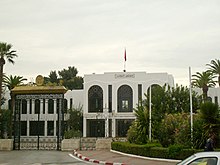Chamber of Deputies (Tunisia)
The Chamber of Deputies ( Arabic مجلس النواب Majlis an-Nuwwāb , DMG maǧlis an-nūwāb ; French Chambre des députés ) wasthe lower house in the bicameral system of Tunisia from the constitutional reform of 2002 to the repeal of the constitution in the wake of the Tunisian revolution in 2011 . Previously, according to the 1959 constitution, there had been a unicameral parliament , which was called the National Assembly from its entry into force until 1981, and then also called the Chamber of Deputies. Under the post-revolutionary constitution of 2014 there is again a unicameral parliament called the People's Representative Assembly .
The Chamber of Deputies last consisted of 214 members (from the 2009 election to its dissolution in 2011). It met in part of the Bardo Palace in the Tunis suburb of Le Bardo .
history
From 1959 to 2011 the National Assembly or Chamber of Deputies was dominated by the respective ruling party - until 1964 the Neo Destur Party , then until 1988 the Socialist Destur Party (PSD) and finally the Constitutional Democratic Collection (RCD). The PSD was the only legal party until 1983, but even after that the few opposition parties allowed to vote had no real chance due to the election laws tailored to the PSD and RCD. In March 2011 the RCD was dissolved in the course of the "Jasmine Revolution" .
On October 23, 2011, the Constituent Assembly was elected, the first free election in the country's history. The term of the Constituent Assembly should be one year, actually it took account of the difficult Verfassunggebungsprozesses more than three years until the first regular election under the new constitution of 2014. This looks again unicameral before extending people's representative assembly called.
See also
Individual evidence
- ↑ Ralf Melzer: Nothing new in Tunisia. The October 25 elections - No surprises, but speculation about the "time after". Friedrich-Ebert-Stiftung Tunis, October 2009, PDF document
- ↑ Historical vote - Tunisia goes to the first free election SPIEGEL ONLINE , October 23, 2011

